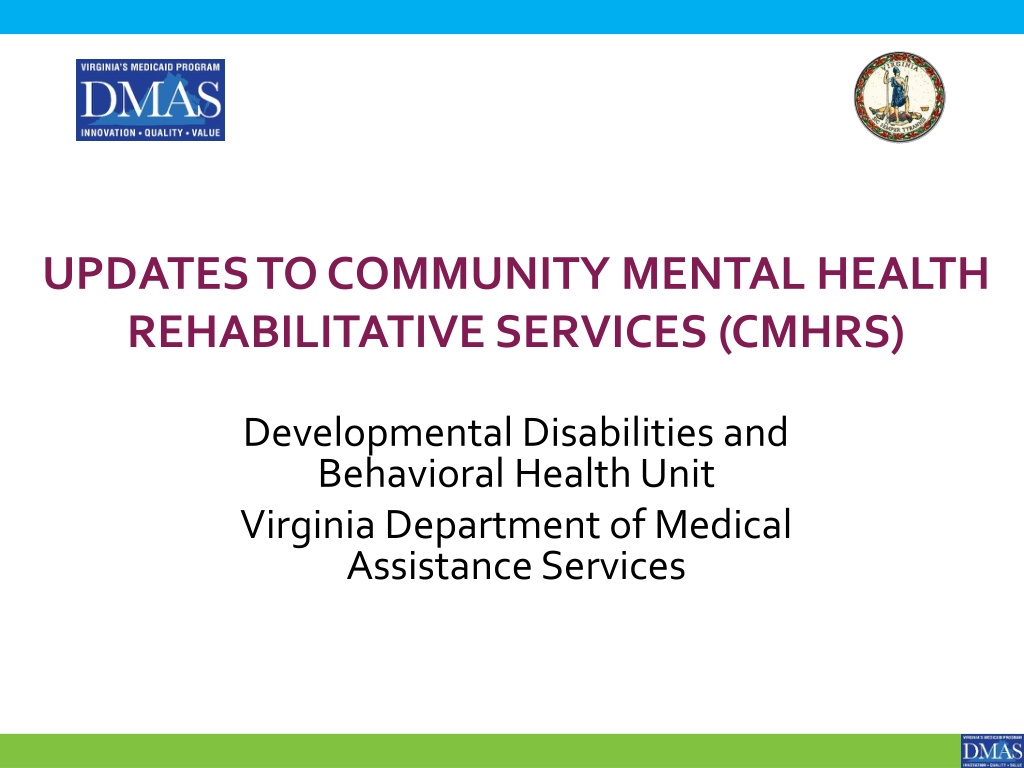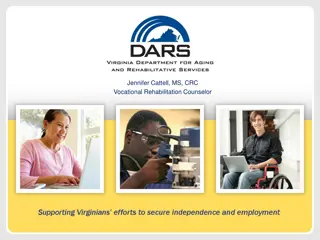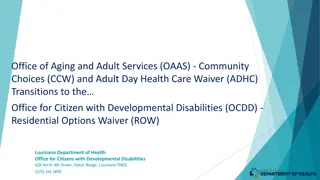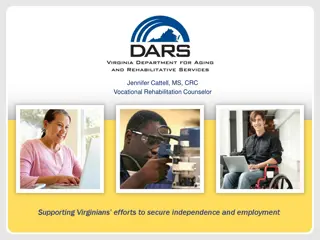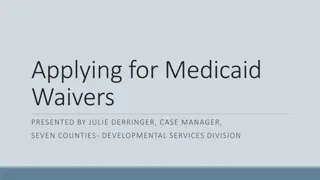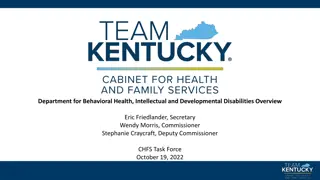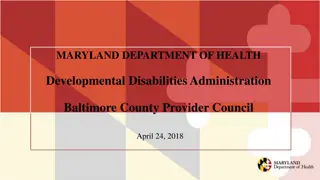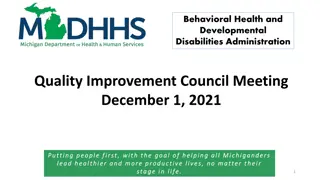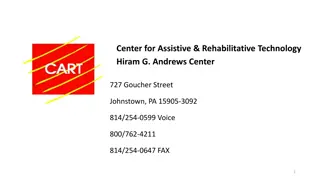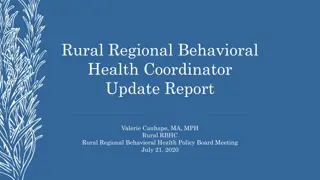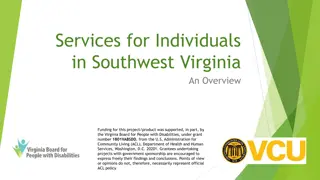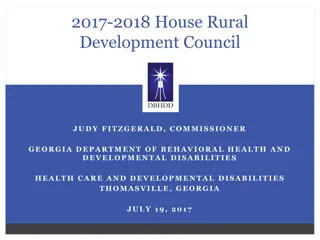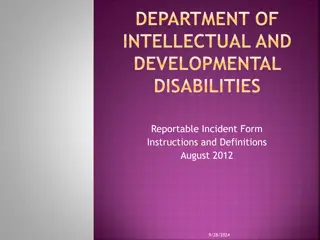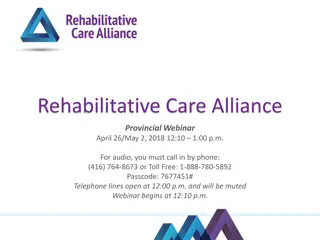Updates to Community Mental Health Rehabilitative Services (CMHRS) Developmental Disabilities and Behavioral Health Unit Virginia Department of Medical Assistance Services
Review the recent changes to the CMHRS Provider Manual, including the implementation of the Comprehensive Needs Assessment effective January 1, 2019, clarification on psychiatric evaluation in Crisis Stabilization services, and the removal of the At Risk of Physical Injury form requirement in Therapeutic Day Treatment and Intensive In-Home services. The Comprehensive Needs Assessment aims to streamline the assessment process, enhance efficiency, and improve access to care for individuals receiving CMHRS services. Providers must adhere to the guidelines outlined in the CMHRS Medicaid Memo dated November 20, 2018, when conducting assessments for new service requests or outdated recommendations. Examples of assessments scenarios are provided to illustrate the application of these changes in practice.
Download Presentation

Please find below an Image/Link to download the presentation.
The content on the website is provided AS IS for your information and personal use only. It may not be sold, licensed, or shared on other websites without obtaining consent from the author. Download presentation by click this link. If you encounter any issues during the download, it is possible that the publisher has removed the file from their server.
E N D
Presentation Transcript
UPDATES TO COMMUNITY MENTAL HEALTH REHABILITATIVE SERVICES (CMHRS) Developmental Disabilities and Behavioral Health Unit Virginia Department of Medical Assistance Services
Agenda Reviewing the most recent CMHRS Medicaid Memo that reflects changes to the CMHRS Provider Manual to include the following: Implementing the Comprehensive Needs Assessment (effective January 1, 2019); Clarifying the recommendation for a psychiatric evaluation in Crisis Stabilization services; and Removing the At Risk of Physical Injury form (P502) requirement in Therapeutic Day Treatment (TDT) and Intensive In-Home (IIH) Services. Special recognition of participants in the development of the memo and presentation. 2
Comprehensive Needs Assessment Effective January 1, 2019 DMAS is implementing the Comprehensive Needs Assessment in CMHRS to allow for a single assessment to be used when recommending one or more CMHRS services provided by the same Department of Behavioral Health and Developmental Services (DBHDS) licensed agency. Allowing one Comprehensive Needs Assessment in place of multiple Service-Specific Provider Intakes (SSPIs) is intended to support efficiency and access to care by reducing the time and administrative burden on providers and members they serve. 3
Comprehensive Needs Assessment Effective January 1, 2019 A Comprehensive Needs Assessment that follows the guidelines in the CMHRS Medicaid Memo dated November 20, 2018, is required for new requests for CMHRS services and for CMHRS services previously recommended by a SSPI that is outdated (greater than 12 months old). SSPIs and Psychiatric Diagnostic Interviews completed prior to January 1, 2019 will not apply to the Comprehensive Needs Assessment criteria. 4
Comprehensive Needs Assessment Example #1 Provider Black Panther performs an Intensive In-home (IIH) SSPI for Tim, a 13 year old, on 12/7/18. However Provider Black Panther does not initiate services until 1/4/2019. The SSPI would be valid for IIH through 12/6/19. Provider Black Panther would not have to update the assessment as part of a Comprehensive Needs Assessment until 12/7/19 unless services lapse for more than 31 days or Tim s needs change. 5
Comprehensive Needs Assessment Example #2 In April 2019, Tim s needs change and he requires school based TDT in addition to IIH. Provider Black Panther is also licensed for TDT. Since the assessment used for Tim s IIH is a SSPI, it can not be used as a Comprehensive Needs Assessment. Provider Black Panther will have to conduct a new Comprehensive Needs Assessment for TDT. 6
Comprehensive Needs Assessment Agency Definition Licensed agencies include providers with a specific DBHDS license to provide one or more of the following services: Intensive In-Home Services (IIH) Psychosocial Rehabilitation (PSR) Therapeutic Day Treatment (TDT) Day Treatment/Partial Hospitalization Mental Health Skill-Building (MHSS) Intensive Community Treatment (ICT) Crisis Stabilization Crisis Intervention Mental Health Case Management 7
Comprehensive Needs Assessment Professionals Conducting the Assessment The Comprehensive Needs Assessment, including all addendums, shall be conducted and documented by a: Licensed Mental Health Professional (LMHP); LMHP-Resident (LMHP-R); LMHP-Supervisee (LMHP-S); or LMHP Resident in Psychology (LMHP-RP). 8
Comprehensive Needs Assessment Assessments and Reassessments Means the face-to-face interaction in which the provider obtains information from the individual, and parent, guardian, or other family member or members, as appropriate, about the individual s mental health status. It includes documented history of the severity, intensity, and duration of mental health problems and behavioral and emotional issues. 9
Comprehensive Needs Assessment Requirements The Comprehensive Needs Assessment must: Document the medical necessity for each recommended CMHRS service (including mental health case management) provided by the agency; Be face-to-face with the member and appropriate family members, guardians, or member representative; and Include all 15 elements previously required of the SSPI. 10
Comprehensive Needs Assessment Requirements (continued) The Comprehensive Needs Assessment is required prior to the development of the Individual Service Plan (ISP) for each service and is used as the basis for the ISP for the entire duration of services. All providers shall ensure they meet the DMAS requirements as well as the DBHDS licensing requirements for completion of assessments. 11
DMAS Billing Requirements for the Comprehensive Needs Assessment (15 Elements) vs DBHDS Licensing Requirements
#1 Presenting Issue(s)/Reason for Referral: Chief Complaint DMAS DBHDS* Indicate duration, frequency and severity of behavioral health symptoms. Identify precipitating events/stressors, relevant history.) If a child is at risk of an out of home placement, state the specific reason and what the out-of- home placement may be. Presenting needs including the individual's stated needs, psychiatric needs, support needs, and the onset and duration of problems; Onset and duration of problems *Italicized and Underlined = Initial Assessment Requirements Bold = items DBHDS requires that are not required by DMAS, list is not inclusive of all differences. Providers are responsible for ensuring compliance with DBHDS requirements. 13
#2 Behavioral Health History/Hospitalizations: DMAS DBHDS Give details of mental health history and any mental health related hospitalizations and diagnoses. List family members and the dates and the types of mental health treatment that family members either are currently receiving or have received in the past. Previous interventions and outcomes; diagnosis 14
#3 Previous Interventions by providers and timeframes and response to treatment: DMAS DBHDS include the types of interventions that have been provided to the individual. Include the date of the mental health interventions and the name of the mental health provider. Previous interventions and outcomes 15
#4 Medical Profile: DMAS DBHDS Describe significant past and present medical problems, illnesses and injuries, known allergies, current physical complaints and medications. As needed, conduct an individualized fall risk assessment to indicate whether the individual has any physical conditions or other impairments that put her or him at risk for falling. All children aged 10 years or younger should be assessed for fall risks based on age-specific norms. Current Medical problems Current medications As applicable, and in all residential services, fall risk, communication methods or needs, and mobility and adaptive equipment needs. Health history and current medical care needs, to include: Allergies; Recent physical complaints and medical conditions; Nutritional needs; Chronic conditions; Communicable diseases; Restrictions on physical activities if any; Restrictive protocols or special supervision requirements; Past serious illnesses, serious injuries, and hospitalizations; Serious illnesses and chronic conditions of the individual's parents, siblings, and significant others in the same household; and Current and past substance use including alcohol, prescription and nonprescription medications, and illicit drugs 16
#5 Developmental History: DMAS DBHDS Social, behavioral, developmental, and family history and supports; Describe the individual as an infant and as a toddler: individual s typical affect and level of irritability; medical/physical complications/illnesses; interest in being held, fed, played with and the parent s ability to provide these; parent s feelings/thoughts about individual as an infant and toddler. Was the individual significantly delayed in reaching any developmental milestones, if so, describe. Were there any significant complications at birth? History of abuse, neglect, sexual, or domestic violence, or trauma including psychological trauma; cognitive functioning including strengths and weaknesses 17
#6 Educational/Vocational Status: DMAS DBHDS School, grade, special education/IEP status, academic performance, behaviors, suspensions/expulsions, any changes in academic functioning related to stressors, tardiness/attendance, and peer relationships. Financial resources and benefits Employment, vocational, and educational background 18
#7 Current Living Situation, Family History and Relationships: DMAS DBHDS Describe the daily routine and structure, housing arrangements, financial resources and benefits. Significant family history including family conflicts, relationships and interactions affecting the individual and family's functioning should be listed along with a list of all family or household members. Social, behavioral, developmental, and family history and supports; Housing arrangements; 19
#8 Legal Status: Indicate individuals criminal justice status: DMAS DBHDS Pending charges, court hearing date, probation status, past convictions, current probation violations, past incarcerations. Legal status including authorized representative, commitment, and representative payee status; Relevant criminal charges or convictions and probation or parole status; 20
#9 Drug and Alcohol Profile: DMAS DBHDS Current and past substance use including alcohol, prescription and nonprescription medications, and illicit drugs Psychiatric and substance use issues including current mental health or substance use needs, presence of co-occurring disorders, history of substance use or abuse, and circumstances that increase the individual's risk for mental health or substance use issues; Describe substance use by the individual and/or family members; specify the type of substance with frequency and duration of usage. Include any treatment or other recovery related efforts. 21
#10 Resources and Strengths: DMAS DBHDS Document individual s strengths, preferences, extracurricular, community and social activities, extended family; activities that the individual engages in or are meaningful to the individual. These elements are key to developing an ISP that supports the individual s recovery and resiliency efforts and goals. Daily living skill Ability to access services including transportation needs 22
#11 Mental Status Profile: DMAS DBHDS Include findings and clinical tools used. At-risk behavior to self and others. 23
#12 Diagnosis: DMAS DBHDS The documentation of a diagnosis must include the DSM diagnostic code & description as documented by the LMHP that provided the diagnosis. Diagnosis Cognitive functioning including strengths and weaknesses; 24
#13 Professional Comprehensive Needs Assessment Summary and Clinical Formulation: DMAS Includes a documentation of medically necessary services as defined by the service provider which: Identifies as much as possible, the causes of presenting treatment issues, and Identifies and discusses treatment options, outcomes, and potential barriers to progress, so that an individual specific service plan can be developed. DBHDS Psychiatric and substance use issues including current mental health or substance use needs, presence of co-occurring disorders, history of substance use or abuse, and circumstances that increase the individual's risk for mental health or substance use issues Onset and duration of problems Presenting needs including the individual's stated needs, psychiatric needs, support needs, and the onset and duration of problems; 12VAC35-105-660.B : The provider shall develop an initial person-centered ISP for the first 60 days for mental retardation (intellectual disability) and developmental disabilities services or for the first 30 days for mental health and substance abuse services. This ISP shall be developed and implemented within 24 hours of admission to address immediate service, health, and safety needs and shall continue in effect until the ISP is developed or the individual is discharged, whichever comes first. 25
#14 Recommended Care and Treatment Goals DMAS DBHDS 12VAC35-105-660.B : The provider shall develop an initial person- centered ISP for the first 60 days for mental retardation (intellectual disability) and developmental disabilities services or for the first 30 days for mental health and substance abuse services. This ISP shall be developed and implemented within 24 hours of admission to address immediate service, health, and safety needs and shall continue in effect until the ISP is developed or the individual is discharged, whichever comes first. To build the ISP 26
#15 Dated signature of the LMHP, LMHP- R, LMHP-RP or LMHP-S. DMAS DBHDS 12VAC35-105-590.C.4: Supervision shall include responsibility for approving assessments and individualized services plans, as appropriate. This responsibility may be delegated to an employee or contractor who meets the qualification for supervision as defined in this section. Who completed the Comprehensive Needs Assessment. 12VAC35-105-590.C.5: Supervision of mental health, substance abuse, or co- occurring services that are of an acute or clinical nature such as outpatient, inpatient, intensive in-home, or day treatment shall be provided by a licensed mental health professional or a mental health professional who is license-eligible and registered with a board of the Department of Health Professions. 27
Comprehensive Needs Assessment Psychiatric Diagnostic Interview A DBHDS licensed agency may use a Psychiatric Diagnostic Interview (90791, 90792) completed by a LMHP, LMHP-R, LMHP-RP or LMHP-S (who is employed or contracted by the same agency) as the Comprehensive Needs Assessment. All 15 required elements for the Comprehensive Needs Assessment shall be included. The practitioner/agency conducting the Psychiatric Diagnostic Interview must be credentialed with Magellan of VA or the MCO to bill for CPT Codes 90791/90792. 28
Comprehensive Needs Assessment Psychiatric Diagnostic Interview If not all 15 required elements are included in the Psychiatric Diagnostic Interview, a LMHP, LMHP-R, LMHP-RP or LMHP-S may create an addendum to address any of the missing elements required for a Comprehensive Needs Assessment to recommend CMHRS services. Providers shall not bill for this addendum to the Psychiatric Diagnostic Interview. 29
Comprehensive Needs Assessment Psychiatric Diagnostic Interview Example #3 A psychiatrist, Dr. Captain America, employed by the CSB conducts a psychiatric diagnostic interview on John, a 53 year old male seen through same day access. Dr. America recommends MHSS for John. The CSB may use the psychiatric diagnostic interview as a Comprehensive Needs Assessment for MHSS if all 15 required elements are included. The CPT code for the psychiatric diagnostic interview shall be billed. 30
Comprehensive Needs Assessment Psychiatric Diagnostic Interview Example #4 A psychiatrist, Doctor Strange, contracted by a CSB conducts the psychiatric diagnostic interview on Sally, age 35, and did not include all 15 elements required for the Comprehensive Needs Assessment. Black Widow, who is an LMHP-RP and is employed with the same CSB, determines Sally could benefit for MHSS. Black Widow completes an addendum using the psychiatric diagnostic interview and addressing the additional elements to support the need for the recommendation of MHSS. The CSB would bill for the psychiatric diagnostic interview but not for the addendum. 31
Comprehensive Needs Assessment Multiple Services Provided by the Same Agency When the initial Comprehensive Needs Assessment recommends several CMHRS services for an individual, the provider shall use this assessment for all CMHRS services recommended within the same DBHDS licensed agency. If additional service needs are identified after the completion of the initial Comprehensive Needs Assessment, the provider shall create an addendum to the initial Comprehensive Needs Assessment. 32
Comprehensive Needs Assessment Multiple Services Provided by the Same Agency Providers shall bill for only one Comprehensive Needs Assessment when these services are provided by the same agency. The provider shall bill the most appropriate assessment code, and if recommending more than one service, may choose the higher reimbursed assessment code of the services that are being recommended. 33
Comprehensive Needs Assessment Multiple Services Provided by the Same Agency If the provider later amends the Comprehensive Needs Assessment due to the changing treatment needs of the individual, the addendum to the Comprehensive Needs Assessment is not billable under an assessment code. Remember, face-to-face time to conduct a reassessment for purposes of completing an addendum to the assessment is billable as part of the service unit. Providers shall also update the ISP using this reassessment. 34
Comprehensive Needs Assessment Multiple Services Provided by the Same Agency Example #5 Provider Iron Man is recommending IIH and TDT in the initial Comprehensive Needs Assessment for Judy, age 8. Provider Iron Man shall bill only one assessment code and may choose the higher reimbursement of the two: IIH Assessment/H0031 at $60.00. The billing code and reimbursement rate must follow the DMAS rate schedule. 35
Comprehensive Needs Assessment Multiple Services Provided by the Same Agency Example #6 Provider Superman performs the initial Comprehensive Needs Assessment for Joshua, age 10, and recommends TDT only. Provider Superman would bill the TDT Assessment (H0032 U7) at $36.53. 36
Comprehensive Needs Assessment Multiple Services Provided by the Same Agency Example #7 Provider Superman provided TDT and later amends the Comprehensive Needs Assessment for Joshua, as his needs have changed. The addendum includes a recommendation to add IIH. This is allowed because the addendum is within one year from the date of the Comprehensive Needs Assessment. Provider Superman would not bill for this addendum through the IIH assessment code but could bill for the reassessment under the TDT service hours as long as it is completed face- to-face. After completing the addendum, the provider shall submit the service authorization request for IIH to Joshua's MCO or Magellan of Virginia. 37
Comprehensive Needs Assessment Multiple Services Provided by the Same Agency In example #1, the SSPI for Tim which recommended IIH was completed in December 2018. In April 2019, Provider Black Panther determines Tim meets medical necessity for and would benefit from TDT. Provider Black Panther shall create an initial Comprehensive Needs Assessment that supports the need for TDT and add IIH. Provider Black Panther may bill for either IIH or TDT assessment. The annual reassessment is not due until April 2020. 38
Comprehensive Needs Assessment Multiple Services Provided by Different Agencies When coordinating services with another DBHDS licensed agency, providers should share assessments with appropriate consent from the member; however, the agency receiving the referral shall complete and bill for a new Comprehensive Needs Assessment for the service they are to provide. 39
Comprehensive Needs Assessment Multiple Services Provided by Different Agencies Example #8 If Provider Thor is recommending MHSS and PSR in the initial Comprehensive Needs Assessment for Jack, age 47, but is only licensed to provide MHSS. Provider Thor shall bill the MHSS Assessment code/H0032 U8. Provider Thor would refer the individual to Provider Loki who is licensed to provide PSR. Provider Loki would conduct a new Comprehensive Needs Assessment with Jack, documenting medical necessity for services and bill for the PSR Assessment/H0032 U6. 40
Comprehensive Needs Assessment Multiple Services Provided by Different Agencies Providers should only bill under the assessment code for a service that they will be providing. In the example on the previous slide, if Provider Thor is licensed to provide both MHSS and PSR but will only be providing MHSS, the assessment should be billed under the MHSS assessment code and not under the PSR assessment code. 41
Comprehensive Needs Assessment Multiple Services Provided by Different Agencies Example #9 If Dr. Thanos, a psychiatrist in a private practice, conducts the psychiatric diagnostic interview for Erin, age 23, and determines that Erin could benefit from MHSS and he needs to initiate a referral to Provider Hawkeye, that is licensed by DBHDS to provide MHSS. A LMHP, LMHP-R, LMHP-RP or LMHP-S employed or contracted by Provider Hawkeye would need to conduct a Comprehensive Needs Assessment to support the need for Erin to receive MHSS. In this case, Dr. Thanos would bill for the psychiatric diagnostic interview and Provider Hawkeye would bill for the comprehensive needs assessment. 42
Comprehensive Needs Assessment Services that can be Included as Part of a Comprehensive Needs Assessment Intensive In-Home Services (IIH) Psychosocial Rehabilitation (PSR) Therapeutic Day Treatment (TDT) Day Treatment/Partial Hospitalization Mental Health Skill-Building (MHSS) Intensive Community Treatment (ICT) (continued) 43
Comprehensive Needs Assessment Services that can be Included as Part of a Comprehensive Needs Assessment Crisis Stabilization * Crisis Intervention * * A Certified Pre-screener who is not a LMHP, LMHP-R, LMHP-RP or LMHP-S may conduct the assessment for crisis services only. This assessment shall not be used as a Comprehensive Needs Assessment or amended by a LMHP, LMHP-R, LMHP-RP or LMHP-S to be used as a Comprehensive Needs Assessment. (continued) 44
Comprehensive Needs Assessment Services that can be Included as Part of a Comprehensive Needs Assessment Mental Health Case Management* * A qualified mental health case manager who is not a LMHP, LMHP-R, LMHP-RP or LMHP-S may conduct the assessment for mental health case management only. These assessments are billed as part of the first month of mental health case management services (H0023). An assessment completed by a qualified mental health case manager who is not a LMHP, LMHP-R, LMHP-RP or LMHP-S may not be used as a Comprehensive Needs Assessment or amended by a LMHP, LMHP-R, LMHP-RP or LMHP-S to be used as a Comprehensive Needs Assessment. 45
Comprehensive Needs Assessment Services that can be Included as Part of a Comprehensive Needs Assessment Example #10 Shuri, a qualified mental health case manager who is a LMHP S conducts the assessment for mental health case management for Sarah, age 14. During the assessment, Shuri determines that Sarah could benefit from IIH as well. Shuri shall use this assessment as a Comprehensive Needs Assessment because she addressed all required 15 elements. Shuri may bill for the IIH Assessment (H0031). At the end of the month, she may also bill the monthly mental health case management services as long as the case management activities are met for billing. 46
Comprehensive Needs Assessment Services that Cannot be Included as Part of a Comprehensive Needs Assessment The services listed below require program specific assessments and may not be used as part of a Comprehensive Needs Assessment Substance Use Case Management Treatment Foster Care Case Management Governor s Access Pan (GAP) Case Management Behavioral Therapy Addiction and Recovery Treatment Services Peer Support Services 47
Comprehensive Needs Assessment Addendum Requirements At a minimum, the addendum must: Clearly document the medical necessity for the additional service. Become part of the Comprehensive Needs Assessment and be accessible in the member s medical record. Be signed and dated by the LMHP, LMHP-R, LMHP-RP or LMHP-S conducting the assessment. The addendum is valid as long as the Comprehensive Needs Assessment is current. The Comprehensive Needs Assessment is considered outdated if more than 12 months old. The ISP shall be updated to reflect any changes in the individual s needs. 48
Comprehensive Needs Assessment Reassessments The initial Comprehensive Needs Assessment (including any addendums to the assessment) is valid for one year from the date of the initial assessment. When providers create a Comprehensive Needs Assessment to replace an outdated SSPI, they may choose to use the Comprehensive Needs Assessment to update the assessments for all services they provide, even if the SSPIs for the other services are still valid. The ISP shall continued to be reviewed quarterly (90 calendar days), updated annually, and as the needs, goals and progress of the individual changes. Providers may choose to align ISP reviews if improves workflow processes. 49
Comprehensive Needs Assessment Reassessments Example #11 Provider Winter Soldier completed Tim s SSPI for IIH in December 8, 2018. Provider Winter Soldier completed a Comprehensive Needs Assessment for Tim and recommended TDT on April 20, 2019. Since Provider Winter Soldier is providing both IIH and TDT, they shall include IIH in the Comprehensive Needs Assessment conducted on April 20, 2019 to recommend TDT. Thus, the annual reassessment for IIH and TDT would not be due until April 19, 2020, unless Tim s needs change. 50
